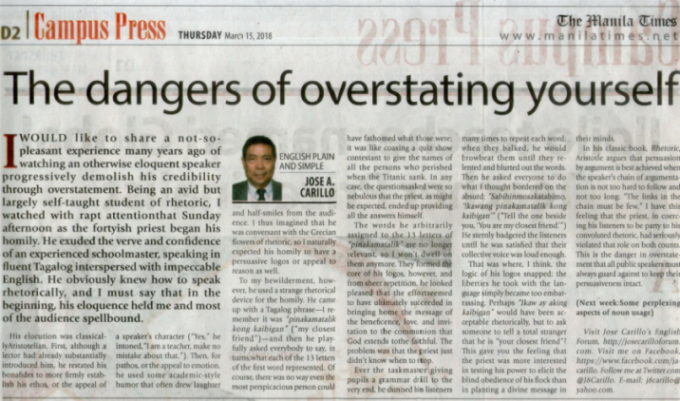I would like to share a not-so-pleasant experience many years ago of watching an otherwise eloquent speaker progressively demolish his credibility through overstatement. Being an avid but largely self-taught student of rhetoric, I watched with rapt attention that Sunday afternoon as the fortyish priest began his homily. He exuded the verve and confidence of an experienced schoolmaster, speaking in fluent Tagalog interspersed with impeccable English. He obviously knew how to speak rhetorically, and I must say that in the beginning, his eloquence held me and most of the audience spellbound.
ARISTOTLE: Persuasion by argument is best achieved when the links in the
speaker’s chain of argumentation are few.
His elocution was classically Aristotelian. First, although a lector had already substantially introduced him, he restated his bona fides to more firmly establish his
ethos, or the appeal of a speaker’s character (“Yes,” he intoned, “I am a teacher, make no mistake about that.”). Then, for
pathos, or the appeal to emotion, he used some academic-style humor that often drew laughter and half-smiles from the audience. I thus imagined that he was conversant with the Grecian flowers of rhetoric, so I naturally expected his homily to have a persuasive
logos or appeal to reason as well.
To my bewilderment, however, he used a strange rhetorical device for the homily. He came up with a Tagalog phrase—I remember it was
“pinakamatalik kong kaibigan” (“my closest friend”)—and then he playfully asked everybody to say, in turns, what each of the 13 letters of the first word represented. Of course, there was no way even the most perspicacious person could have fathomed what those were; it was like coaxing a quiz show contestant to give the names of all the persons who perished when the Titanic sank. In any case, the questions asked were so nebulous that the priest, as might be expected, ended up providing all the answers himself.
The words he arbitrarily assigned to the 13 letters of
“pinakamatalik” are no longer relevant, so I won’t dwell on them anymore. They formed the core of his logos, however, and from sheer repetition, he looked pleased that the effort seemed to have ultimately succeeded in bringing home the message of the beneficence, love, and invitation to the communion that God extends to the faithful. The problem was that the priest just didn’t know when to stop.
Ever the taskmaster giving pupils a grammar drill to the very end, he dunned his listeners many times to repeat each word; when they balked, he would browbeat them until they relented and blurted out the words. Then he asked everyone to do what I thought bordered on the absurd:
“Sabihin mo sa katabi mo, ‘Ikaw ang pinakamatalik kong kaibigan’” (“Tell the one beside you, ‘You are my closest friend.’”) He sternly badgered the listeners until he was satisfied that their collective voice was loud enough.
That was where, I think, the logic of his
logos snapped; the liberties he took with the language simply became too embarrassing. Perhaps
“Ikaw ay aking kaibigan” would have been acceptable rhetorically, but to ask someone to tell a total stranger that he is “your closest friend”? This gave you the feeling that the priest was more interested in testing his power to elicit the blind obedience of his flock than in planting a divine message in their minds.
In his classic book,
Rhetoric, Aristotle argues that persuasion by argument is best achieved when the speaker’s chain of argumentation is not too hard to follow and not too long: “The links in the chain must be few.” I have this feeling that the priest, in coercing his listeners to be party to his convoluted rhetoric, had seriously violated that role on both counts. This is the danger in overstatement that all public speakers must always guard against to keep their persuasiveness intact.
 This essay, 1083rd in the series, appeared in the column “English Plain and Simple” by Jose A. Carillo in the Campus Press section of the March 15, 2018 issue (print edition only) of
This essay, 1083rd in the series, appeared in the column “English Plain and Simple” by Jose A. Carillo in the Campus Press section of the March 15, 2018 issue (print edition only) of The Manila Times
, © 2018 by the Manila Times Publishing Corp. All rights reserved.(Next week:
Some perplexing aspects of noun usage) March 22, 2018